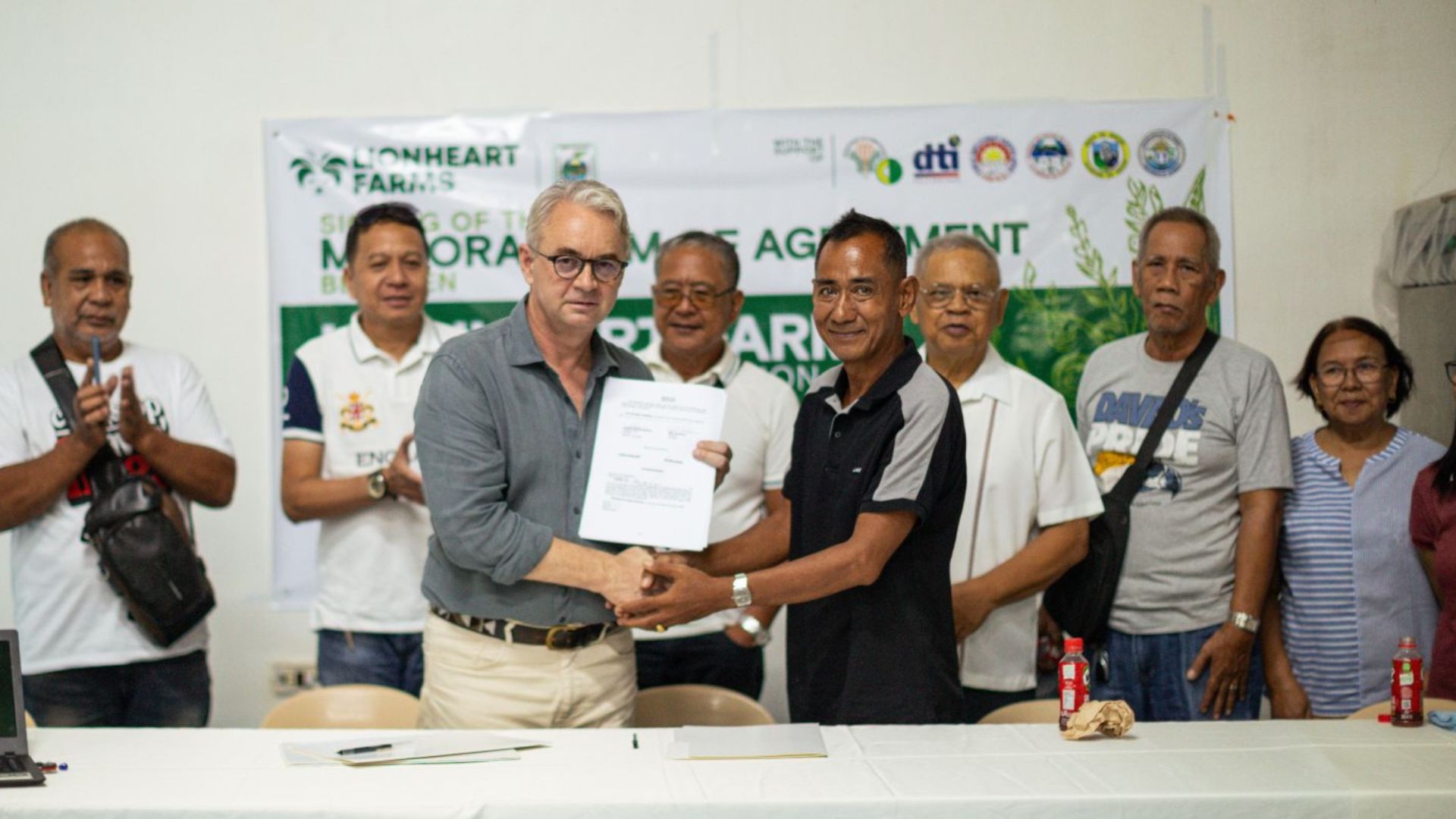 A wave of optimism is washing over Alabat Island, Quezon Province, as Lionheart Farms (Philippines) Corporation (LFPC) from Palawan and the Alabat Island Farmer’s Producer Cooperative (AIFPC) join forces to revitalize the island’s coconut sap production. This momentous partnership, sealed with a signed Memorandum of Agreement (MOA) on July 19, 2024, promises to breathe new life into a once-thriving industry and empower local communities.
A wave of optimism is washing over Alabat Island, Quezon Province, as Lionheart Farms (Philippines) Corporation (LFPC) from Palawan and the Alabat Island Farmer’s Producer Cooperative (AIFPC) join forces to revitalize the island’s coconut sap production. This momentous partnership, sealed with a signed Memorandum of Agreement (MOA) on July 19, 2024, promises to breathe new life into a once-thriving industry and empower local communities.
The project focuses on generating income for coconut palm owners and creating jobs for coconut sap harvesters within the cooperative. Lionheart Farms, known for its commitment to sustainable agriculture and global market reach, will play a key role in connecting Alabat’s farmers with international consumers seeking high-quality coconut sap products.
The benefits extend beyond immediate economic gains. Chairman Joel Arandela of the AIFPC Board of Directors and farm owner noted that “The partnership will surely provide employment to farmers and future generations.”
 Reviving a Legacy, Building a Brighter Future
Reviving a Legacy, Building a Brighter Future
Alabat Island boasts a rich history of successful coconut sap production. However, recent years have seen a decline due to challenges in market access and consistent buying commitments. This new agreement seeks to change that narrative, reviving Alabat’s legacy as a producer of high-quality coconut sap products and establishing a sustainable future for the industry.
Previously, the lack of required certifications hampered Alabat’s coconut farmers from accessing markets. “This partnership, with its focus on organic certification, will address this critical roadblock and unlock new opportunities for scale and marketability,” according to Alabat Negosyo Center Manager Victoria Gonzales from the Department of Trade and Industry who has been involved in the project since the beginning.
Key Highlights of the Agreement:
The partnership outlines a multi-pronged approach to revitalize the industry:
- Phase I: Lionheart Farms will initially rent 25,000 coconut palms for sap harvesting, offering monthly rental payments to owners and prioritizing employment opportunities for them.
- Expansion Potential: Upon successful implementation and consistent performance, the project has the option to expand the number of palms and establish high-value processing facilities within Alabat.
- Job Creation: The project is expected to create 500-600 full-time jobs in Alabat, encompassing roles like coconut sap harvesters, quality controllers, and various support functions. Harvesters will receive weekly payments.
- Market Access and Processing: Lionheart Farms will establish a dedicated coconut sap receiving station within the existing Alabat CocoHub and purchase all harvested sap. The company will also provide its operational expertise, know-how, and processing systems to support the project.
- Long-Term Commitment: Both parties are committed to long-term capacity building within the Alabat community. Lionheart Farms will invest an estimated PHP 50 million for operational capital in Phase I, while the cooperative will operate a cost-plus model to ensure its financial stability.
- Organic Certification: Recognizing the importance of sustainable practices, the project prioritizes organic certification. This will not only benefit the environment but also open doors to premium markets seeking organic coconut sap products.
 A Sustainable Future for Alabat
A Sustainable Future for Alabat
Lionheart Farms CEO Christian Eyde Moeller states, “This partnership is a testament to our commitment to empowering Filipino farmers and communities and connecting them to global markets. By reviving coconut sap production in Alabat Island, we’re not just creating jobs and economic opportunities, but also ensuring the industry’s long-term sustainability as we hope to bring this model to more communities throughout the Philippines
Local leaders echoed this sentiment. The Municipal Vice Mayor of Alabat, Ireneo R. Layosa Jr., highlighted the economic progress anticipated for the cooperative, farm owners, and the broader community. “The improvement will not only focus on the partnership but also on the living conditions of the community and the surrounding business establishments.”
The project is expected to see its first harvest before the end of July, with operations scaling up in August. By October, the goal is to reach a harvest level of at least 10,000 palms, eventually reaching the full capacity of 25,000 palms and employing 500-600 individuals by year-end.
The local PESO representative underscored the impact of this initiative on families, “The security of employment assures that the farmers will be able to provide food on their tables. They can also secure the future of their children because they can send their children to school.”
A Perez Municipal Agricultural Office representative also pointed out the environmental benefits of this partnership, “The regenerative organic process is beneficial to the environment because it counters climate change. Although the organic process in farming is a long procedure, the benefit to the plants and the environment is long-term.”
Christian Eyde Moeller adds, “The island of Alabat is a farmers community that has already recognized the possibilities in coconut flower harvesting with the valuable support of the Philippine Coconut Authority. And we are proud to be able to elevate it further and build on the foundation created.”
This agreement marks a significant step forward for both Lionheart Farms and Alabat Island. By combining Lionheart’s expertise with the cooperative’s local knowledge and resources, the project has the potential to revitalize the coconut sap industry in Alabat, create a sustainable source of income for farmers, and bring high-quality Philippine coconut flower sap products to a global audience.



